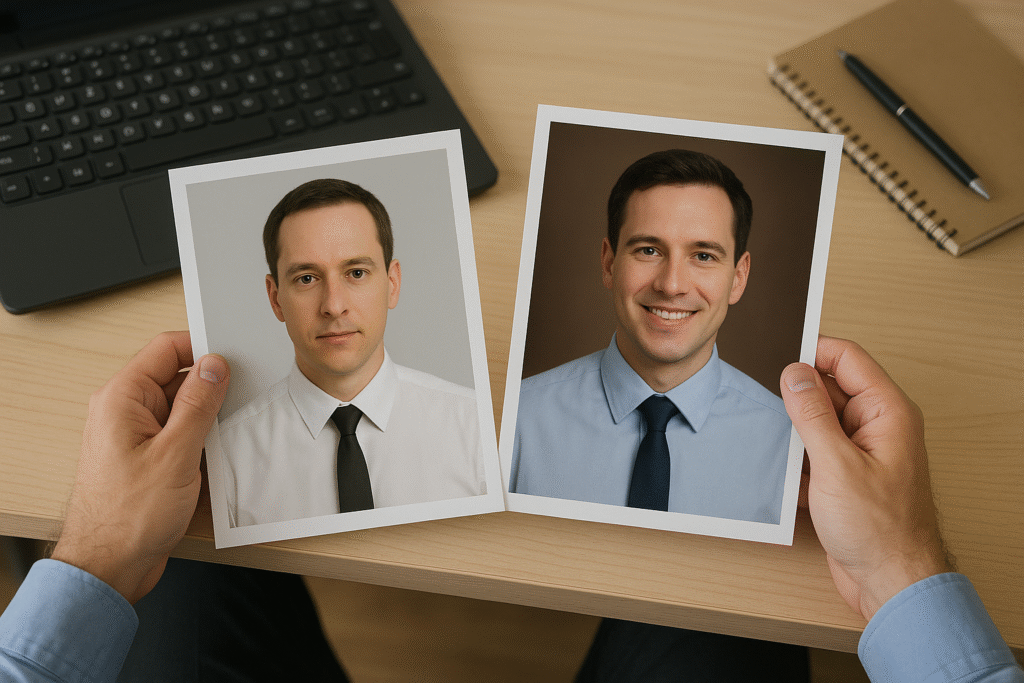By Harshit | October 20, 2025 12:00 AM EDT
The Rise of AI Headshots
In the digital era, first impressions increasingly happen through a screen, and a professional-looking photo on LinkedIn or a resume has become as critical as the qualifications listed. For many job seekers, however, hiring a professional photographer has long been a costly barrier. The average headshot session in the U.S. can run into hundreds of dollars, putting quality photography out of reach for students, early-career professionals, and those on tight budgets.
AI-generated headshots are emerging as an affordable alternative, offering realistic, polished portraits in minutes. Platforms such as InstaHeadshots, PhotoPacksAI, HeadshotPro, Aragon AI, and even Canva now allow users to upload selfies and generate professional-quality images starting at under $50, bypassing the need for a studio, lighting setup, or editing team.
Melanie Fan, head of growth at AI platform Plush, recalls her frustration during her time at Yale. “It was $200 for a 15-minute session for students,” she said. “The process of selecting, editing, and receiving the final photos was tedious and expensive.”
AI headshots promise to simplify this process. “After I changed my LinkedIn photo using AI, the amount of inbound interest from companies skyrocketed,” Fan added. “Three to four times more messages from recruiters.”
Why Professionals Are Turning to AI
According to a recent Canva job market research report, 88% of job seekers believe a polished digital presence influences hiring decisions, a 45% increase from the previous year. With AI becoming integrated into the hiring process itself—90% of recruiters report using AI for screening and reviewing candidates—having a visually appealing profile is increasingly strategic.
Danny Wu, Canva’s head of AI products, emphasizes accessibility. “This is not about replacing photography but making high-quality imagery attainable to everyone, no matter their budget or location,” Wu said. Canva’s AI allows users to adjust backgrounds, retouch details, and style photos while maintaining realism, helping job seekers present their best selves.
Chris Bora, a former Meta engineer, built Nova Headshot to address common issues in AI-generated images. “Some tools distorted appearances or lightened skin tones,” he said. “Nova makes you look like yourself on your best day, in under ten minutes.”
The Authenticity Debate
Despite the convenience and affordability, AI headshots raise questions of authenticity. Recruiters are wary of overly stylized or unnatural-looking images, and poorly executed AI portraits can harm a candidate’s credibility. Sam DeMase, a career expert at ZipRecruiter, noted, “A badly done AI headshot is easily recognized and can hurt your chances. Recruiters still value authenticity above all.”
Amber Collins, an AI headshot user, expressed similar concerns. “Some apps produce distorted images—extra fingers or missing jewelry,” she said. “It feels almost deceptive, and there’s a stigma. I’d prefer real headshots, but AI is much cheaper and faster.”
LinkedIn’s policies also reflect these concerns. A spokesperson told CNBC that profile photos must reflect the user’s actual likeness, and images that violate this policy may be removed.
The tension between accessibility and authenticity is palpable. AI allows Gen Z and millennial job seekers to access studio-quality headshots at minimal cost, but as AI-generated images become harder to distinguish from real photography, recruiters’ scrutiny may increase.
Looking Ahead
Despite the risks, AI headshots are likely to remain popular. A growing number of HR professionals use AI to generate job descriptions and screen resumes, meaning AI-generated visuals may be assessed primarily by algorithms in early hiring stages. For many, the ability to produce a polished, professional image cheaply outweighs concerns over minor distortions.
As the technology improves, balancing realism, personal identity, and professionalism will remain key. Wu encourages users to ensure that AI-generated headshots reflect their true appearance while still taking advantage of enhancements. “The goal is to be professional and unique without losing your identity,” he said.
In an era where visual impressions are paramount, AI headshots offer a democratized solution for job seekers, though the debate over authenticity and ethical use continues. The convergence of AI, hiring practices, and digital identity marks a significant shift in how candidates present themselves to employers—and how employers evaluate talent in a rapidly evolving job market.

